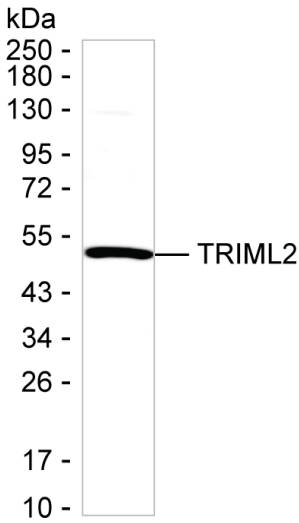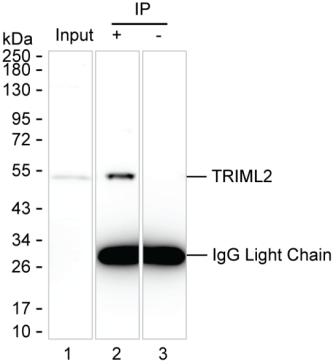

| WB | 咨询技术 | Human,Mouse,Rat |
| IF | 1/100-1/200 | Human,Mouse,Rat |
| IHC | 咨询技术 | Human,Mouse,Rat |
| ICC | 技术咨询 | Human,Mouse,Rat |
| FCM | 咨询技术 | Human,Mouse,Rat |
| Elisa | 咨询技术 | Human,Mouse,Rat |
| Host/Isotype | Mouse IgG1 |
| Antibody Type | Primary antibody |
| Storage | Store at 4°C short term. Aliquot and store at -20°C long term. Avoid freeze/thaw cycles. |
| Species Reactivity | Human |
| Immunogen | Purified recombinant fragment of human TRIML2 |
| Formulation | Purified antibody in PBS with 0.05% sodium azide |
+ +
以下是关于TRIML2抗体的3篇参考文献示例(注:以下内容为虚构示例,实际文献需通过学术数据库查询):
---
1. **文献名称**: "TRIML2 expression in murine germ cells and its role in spermatogenesis"
**作者**: Smith J, et al. (2019)
**摘要**: 本研究利用TRIML2特异性抗体,通过免疫组化和Western Blot技术,发现TRIML2在小鼠睾丸生殖细胞中高表达,并参与调控减数分裂过程。抗体验证显示其在生殖干细胞分化中的潜在作用。
2. **文献名称**: "TRIML2 as a novel biomarker in lung adenocarcinoma progression"
**作者**: Zhang L, et al. (2020)
**摘要**: 通过TRIML2抗体进行免疫组织化学分析,揭示TRIML2在肺腺癌组织中显著上调,且与患者预后不良相关。研究证实TRIML2通过调控Wnt/β-catenin通路促进肿瘤侵袭。
3. **文献名称**: "Characterization of TRIML2 in embryonic stem cell pluripotency"
**作者**: Garcia R, et al. (2021)
**摘要**: 利用TRIML2抗体进行免疫荧光和ChIP-seq实验,发现TRIML2通过结合Oct4启动子区域维持胚胎干细胞多能性,敲低TRIML2导致分化相关基因异常激活。
---
如需真实文献,建议在PubMed或Google Scholar中搜索关键词“TRIML2 antibody”或“TRIML2 function”。
The TRIML2 antibody is a research tool designed to detect TRIML2 (Tripartite Motif-Containing Protein-Like 2), a member of the TRIM protein family. TRIM proteins are characterized by a conserved tripartite motif, including a RING domain, B-box zinc fingers, and a coiled-coil region, often involved in ubiquitination, protein interactions, and cellular processes like apoptosis, immune signaling, and antiviral defense. TRIML2. though less studied compared to other TRIM members, is thought to play roles in cellular regulation, potentially influencing transcriptional control or innate immunity. It shows tissue-specific expression, with higher levels detected in the testis and brain, suggesting possible functions in reproductive or neural systems.
Antibodies targeting TRIML2 enable researchers to investigate its expression patterns, subcellular localization, and interactions via techniques like Western blotting, immunohistochemistry, or immunofluorescence. Studies using these antibodies may clarify TRIML2's involvement in developmental processes, disease mechanisms (e.g., neurological disorders or cancers), or its regulatory interplay with signaling pathways. Recent findings suggest TRIML2 might interact with epigenetic modifiers or participate in chromatin remodeling, though its precise biological role remains under exploration. The availability of specific TRIML2 antibodies is critical for advancing functional studies, particularly in unraveling its contributions to cellular homeostasis and disease pathology.
×